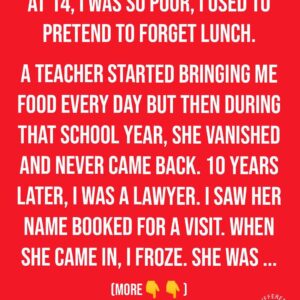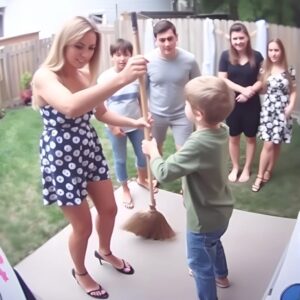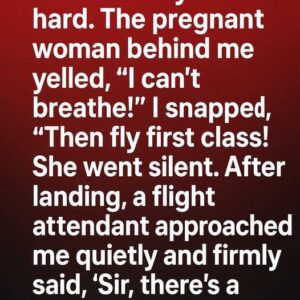Nobody expected fifty bikers at my son’s funeral. Least of all the four teenagers who put him there.
I’m not a crier. Twenty-six years as a high school janitor taught me to keep my emotions locked down tight. But when that first Harley rumbled into the cemetery parking lot, followed by another, then another, until the whole place vibrated with thunder—that’s when I finally broke.
My fourteen-year-old boy, Mikey, had hanged himself in our garage. The note he left mentioned four classmates by name. “I can’t take it anymore, Dad,” he’d written. “They won’t stop. Every day they say I should kill myself. Now they’ll be happy.”
The police called it “unfortunate but not criminal.” The school principal offered “thoughts and prayers” then suggested we have the funeral during school hours to “avoid potential incidents.”
I’d never felt so powerless. Couldn’t protect my boy while he was alive. Couldn’t get justice after he was gone.
Then Sam showed up at our door. Six-foot-three, leather vest, gray beard down to his chest. I recognized him—he pumped gas at the station where Mikey and I would stop for slushies after his therapy appointments.
“Heard about your boy,” he said, standing awkward on our porch. “My nephew did the same thing three years back. Different school, same reason.”
I didn’t know what to say, so I just nodded.
“Thing is,” Sam continued, looking past me like the words hurt to say, “nobody stood up for my nephew. Not at the end, not after. Nobody made those kids face what they did.”
He handed me a folded paper with a phone number. “You call if you want us there. No trouble, just… presence.”
I didn’t call. Not at first. But the night before the funeral, I found Mikey’s journal. Pages of torment. Screenshots of text messages telling my gentle, struggling son to “do everyone a favor and end it.”
My hands shook as I dialed the number.
“How many people you expecting at this funeral?” Sam asked after I explained.
“Maybe thirty. Family, some teachers. None of his classmates.”
“The ones who bullied him—they coming?”
– Advertisement –
“Principal said they’re planning to, with their parents. To ‘show support.’” The words tasted like acid.
Sam was quiet for a moment. “We’ll be there at nine. You won’t have to worry about a thing.”
I didn’t understand what he meant until I saw them the next morning—a sea of leather vests, weathered faces, and solemn eyes. The Hell’s Angels patches visible as they formed two lines leading to the small chapel, creating a corridor of protection.
The funeral director approached me, panic in his eyes. “Sir, there are… numerous motorcycle enthusiasts arriving. Should I call the police?”
“They’re invited guests,” I said.
When the four boys arrived with their parents, confused expressions turned to fear as they saw the bikers.
Three months before the funeral, I’d noticed the change in my son. It started small—he stopped talking about school, stopped inviting friends over. Mikey had always been quiet, more comfortable with his books and sketch pads than with other kids, but this was different. This was withdrawal.
“Everything okay at school?” I asked one night while we washed dishes together—one of our routines since his mom left when he was eight.
“Fine,” he mumbled, eyes fixed on the plate he was drying.
“Made any new friends in high school?” I tried again.
His shoulders tensed slightly. “Not really.”
I should have pushed harder. Should have seen the signs. But I was working double shifts that month—Jenkins was out with back surgery, and I was covering his sector of the school too. By the time I’d finish my rounds, check all the classrooms, and make sure everything was locked up tight, I was dead on my feet.
Still, I noticed the bruises. A scrape on his cheek one Tuesday. A split lip the following week.
“Basketball in gym,” he explained when I asked.
“Tripped on the stairs,” he said another time.
I believed him because I wanted to. Because the alternative meant failing him, and I’d already done enough of that when his mother left.
It was Ms. Abernathy, the school librarian, who first tried to warn me. She caught me in the hallway one afternoon as I was mopping up some spilled soda near the cafeteria.
“Mr. Collins,” she said quietly, “I’ve been meaning to talk to you about Mikey.”
Something in her tone made me stop. “What about him?”
She glanced around to make sure we were alone. “He’s been spending every lunch period in the library. At first, I thought he just liked to read, but…” She hesitated. “I think he’s hiding.”
“Hiding from what?”
“There’s a group of boys—seniors mostly. I’ve seen how they look at him when he passes by. How they whisper. Yesterday, I found Mikey’s backpack in the trash can outside the library.”
I promised her I’d talk to Mikey, and I did try that night. But he shut down completely.
“It’s fine, Dad. I just like the library. It’s quiet.”
A week later, I found his sketchbook in the trash. The pages were soaked with water, the drawings blurred beyond recognition. When I asked about it, he said he’d spilled his drink on it by accident. But there was something in his eyes—a deadness I’d never seen before.
The next day, I requested a meeting with the principal, Mr. Davidson.
“Kids will be kids, Mr. Collins,” he said after listening to my concerns. “High school has a natural pecking order. Mikey needs to toughen up a bit, learn to stand his ground.”
“He’s being bullied,” I insisted.
Davidson sighed, leaning back in his chair. “Look, without specific incidents, names, dates—there’s not much I can do. Has Mikey actually told you someone’s hurting him?”
He hadn’t. And when I pressed him that night, he just retreated further into himself.
“You’re making it worse,” he finally snapped when I wouldn’t let it go. It was the first time he’d ever raised his voice to me. “Just leave it alone, Dad. Please.”
So I did. God help me, I did.
The morning I found him, the garage was quiet in a way that still haunts my dreams. There was no note at first. Just my boy, my Mikey, hanging from a rafter I’d helped him swing from when he was little.
The police were professional but distant. Suicide wasn’t a crime, they reminded me. Just a tragedy. They took photos, asked questions I could barely process, and then left me alone in a house that suddenly felt massive and empty.
It was when I was cleaning his room three days later—needing something, anything, to do with my hands—that I found the note, taped to the bottom of his desk drawer.
“I can’t take it anymore, Dad,” he’d written in his careful handwriting. “They won’t stop. Every day they say I should kill myself. Now they’ll be happy.”
He named four boys: Jason Weber, Tyler Conroy, Drew Halstead, and Marcus Finch. Seniors. Athletes. Sons of the town’s prominent families.
I took the note to the police station immediately, my hands shaking with rage and grief.
Officer Brandt read it twice before looking up at me with genuine sympathy. “I understand you’re looking for answers, Mr. Collins, but…”
“But what? My son named the boys who drove him to kill himself. That’s not enough?”
He shifted uncomfortably. “Words, even cruel ones, aren’t criminal in most cases. Unless there were direct threats, physical assaults we can prove…”
“They told him to kill himself. Every day. And now he has.”





